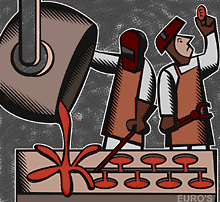
SURVEY EMU
Ever closer union?
EU
Search
archive
|
Why the politics of a single currency could cause disharmony |
|||
National currencies are certainly symbols of sovereignty. When the countries of the former Soviet Union broke away from Russia, one of the first things they did was to introduce their own currencies. The D-mark has become arguably the most potent national totem for post-war Germans—which is partly why they are so reluctant to give it up.
There is also little doubt that joining a currency union means surrendering some sovereignty, even though at Maastricht the then British prime minister, John Major, and his foreign secretary, Douglas Hurd, stoutly denied it. But just what is it that countries are giving up by handing responsibility for monetary policy to the European Central Bank? The immediate answer is: sovereignty to inflate the economy and to devalue the currency. Presumably even eurosceptics favour neither.
Yet this is not all there is to it. Remember that the negotiations leading up to Maastricht embraced two separate inter-governmental conferences: one on monetary union, one on political union. This was because the Germans, in particular, insisted that they would accept monetary union only if greater progress towards political union was in prospect. In the event, they got little. But even today the Bundesbank makes no secret of its view that monetary union necessitates political union.
Does it? There are, it is true, few historical instances of currency unions that have not, ultimately, corresponded with a political union. The 19th-century Latin Monetary Union is one. During this century, Belgium and Luxembourg have shared a currency without being a political unit. Britain and Ireland managed to share a currency for 60 years although they had numerous political clashes and even spent six years with Britain involved in a war and Ireland determinedly neutral.
Yet the European Union is something new and unique: a partially supranational organisation, complete with executive bodies and a supreme court, that stops well short of political union. So, similarly, will the euro be unique: a currency voluntarily shared among several countries, all of them sovereign and democratic. The notion that such an arrangement is bound one day to entail political union is impossible to refute; yet there seems no reason to take it for granted.
Indeed there are two good arguments against superimposing political union on the single currency. One is provided by the most recent European example of a currency union: Germany’s. It is widely believed that the cost of German unification was so high (both in huge fiscal transfers from west to east and in high unemployment in the east) because the federal government insisted, against Bundesbank advice, on converting Ostmarks to D-marks at one-to-one. Yet it was not currency unification that caused the trouble in Germany: it was wage and welfare-benefit unification. In the absence of unified productivity rates, this was bound to make eastern Germany hopelessly uncompetitive. The trouble was that German unification made it politically impossible to maintain separate wage and welfare regimes. So the lesson of German unification for EMU is the opposite of what integrationists claim: EMU may succeed only if it is not accompanied by political union, because that way it will be possible to maintain wage and benefit differentials that reflect differences in productivity and wealth.
The second argument against joining political to currency union is even simpler: Europe’s people are against it. There is a marked lack of popular enthusiasm for the euro in Europe. True, in several countries there seems to be a majority in favour of it (see chart 7). But most Germans do not want it because they are loth to sacrifice the D-mark. And Swedes, Danes, Britons and Finns seem not to want it because they fear a loss of sovereignty.

